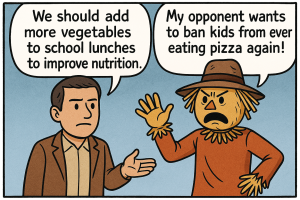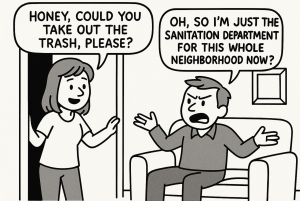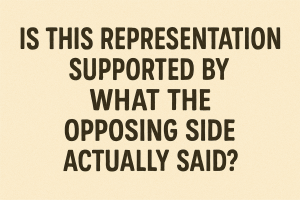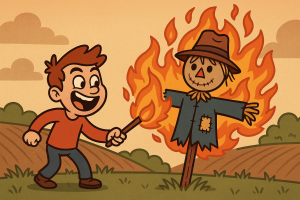Straw Man Arguments
Kainan Jarrette and Diana Daly
What is a straw man argument?

A straw man argument is when someone attacks a distorted, exaggerated, or oversimplified version of the argument that is actually being made.
The term comes from old practices like using straw-filled dummies for military drills or as scarecrows – they lack any real substance.
Imagine a friend told you “I just won a fight with a scarecrow!” It’s unlikely you’d find that very impressive.
Examples


How to Spot a Straw Man argument
A straw man argument can be a little harder to spot, but here are some key points to look for when assessing an argument or response:
- Lack of nuance
- When the original argument is talking about specific aspects of a person, institution, or idea but the response conflates this with talking about the entirety of that person, institution, or idea.
- Example: “We should have some environmental regulations on business” becomes “You want to shut down all business.”
- When the original argument is talking about specific aspects of a person, institution, or idea but the response conflates this with talking about the entirety of that person, institution, or idea.
- Loaded words
- Similar to the above, look for absolutist words like “always,” “never,” “everyone,” or “everything” (among others).
- Example: “I think we should reduce our meat consumption” becomes “You want us to never eat meat.”
- Similar to the above, look for absolutist words like “always,” “never,” “everyone,” or “everything” (among others).
- Ignoring evidence
- If the original argument provided specific evidence, but the response acts as though it didn’t.
- Example: “Studies show a healthy sleep routine improves cognitive functioning” becomes “You can’t just magically become more intelligent by sleeping.”
- If the original argument provided specific evidence, but the response acts as though it didn’t.
When you’re looking at any type of response to an issue or argument, ask yourself:

If it isn’t, you’re looking at a straw man.
Principle of Charity
A good sign someone is arguing fairly is if they’re trying to adhere to the principle of charity – assuming the most reasonable and rational interpretation of someone’s statement or argument, even if it’s flawed, before criticizing it. This is usually done by summarizing the argument in some form.
Unfortunately, this principle is not always seen on social media, which rewards1 speed and outrage (and on some platforms has character or word limits). Given this, if you see a post criticizing an idea or argument, make sure you have a good understanding of what the actual idea or argument is. The best way to do this: hear the argument directly from the person making it, not from someone else’s interpretation of it.
Why straw man arguments Matter
Any type of argumentation – be it formal (a debate) or informal (social media posts) – isn’t about winning, it’s about trying to find truth or trying to persuade. Attacking a weakened form of an argument make feel like scoring points, but it doesn’t do anything to actually strengthen your own argument or get any closer to truth.
Further, and perhaps more importantly, if you keep distorting what people say, you start to distort who you think they are. That’s how arguments become personal and divisions get deeper.
This comes back to our concept of epistemology. You want to make sure you have an accurate view of the world, which includes the people that inhabit it.
Look Who’s Talking!
 Sometimes we can accidentally stumble into making a straw man argument out of a legitimate misunderstanding. But if you see a speaker who frequently misrepresents arguments, they’re likely doing so as an intentional rhetorical strategy, meant to manipulate the audience. This should raise serious red flags, as it undermines their credibility as an accurate source of information.
Sometimes we can accidentally stumble into making a straw man argument out of a legitimate misunderstanding. But if you see a speaker who frequently misrepresents arguments, they’re likely doing so as an intentional rhetorical strategy, meant to manipulate the audience. This should raise serious red flags, as it undermines their credibility as an accurate source of information.
Knowledge Check: Straw Man Arguments
Vocabulary
principle of charity
assuming the most reasonable and rational interpretation of someone’s statement or argument, even if it’s flawed, before criticizing it
rhetorical strategy
any deliberate technique a speaker or writer uses to persuade, influence, or shape how an audience thinks or feels about an issue.
straw man argument
when someone attacks a distorted, exaggerated, or oversimplified version of the argument that is actually being made
References
1 Brady, W. J., McLoughlin, K., Doan, T. N., & Crockett, M. J. (2021). How social learning amplifies moral outrage expression in online social networks. Science advances, 7(33), eabe5641. https://doi.org/10.1126/sciadv.abe5641
Media Attributions
- Straw Man Title © ChatGPT is licensed under a CC0 (Creative Commons Zero) license
- Straw Man Comic 02 © ChatGPT is licensed under a CC0 (Creative Commons Zero) license
- Straw Man Comic 01 © ChatGPT is licensed under a CC0 (Creative Commons Zero) license
- Straw Man Text 01 © ChatGPT is licensed under a CC0 (Creative Commons Zero) license
- Straw Man On Fire © ChatGPT is licensed under a CC0 (Creative Commons Zero) license
a logical fallacy where someone attacks a distorted, exaggerated, or oversimplified version of the argument that is actually being made
assuming the most reasonable and rational interpretation of someone's statement or argument, even if it's flawed, before criticizing it
the study of how we know what we know
any deliberate technique a speaker or writer uses to persuade, influence, or shape how an audience thinks or feels about an issue

